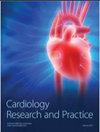心肌梗死中内皮细胞的程序性死亡及其潜在的治疗策略
IF 1.8
4区 医学
Q3 CARDIAC & CARDIOVASCULAR SYSTEMS
引用次数: 2
摘要
心血管疾病,特别是冠状动脉疾病和中风,导致世界上约三分之一的人口死亡,而心肌梗死是冠心病的主要症状,是一个全球性的主要健康问题。心血管疾病的研究历来侧重于促进心肌损伤后的血管生成。心肌血管修复是改善心肌梗死预后的关键。内皮细胞是心肌组织中最大的非肌细胞群,在血管生成中起着重要作用。近年来,不同类型的程序性细胞死亡,如凋亡、坏死坏死、焦亡、铁亡和自噬,已被描述并发现与心血管疾病如心肌梗死、心力衰竭和心肌炎有关。这将对改革心血管疾病的治疗策略具有重要意义。本文综述了心肌梗死中内皮细胞死亡的不同类型,并对其在心肌梗死中的作用和机制进行了综述,认为内皮细胞死亡抑制作为一种治疗心肌梗死的治疗技术可能有利于人类健康。本文章由计算机程序翻译,如有差异,请以英文原文为准。
Programmed Cell Death of Endothelial Cells in Myocardial Infarction and Its Potential Therapeutic Strategy
Cardiovascular disease, especially coronary artery disease and stroke, kills around one-third of the world's population, and myocardial infarction, a primary symptom of coronary heart disease, is a major worldwide health problem. Cardiovascular disease research has historically focused on promoting angiogenesis following myocardial damage. Myocardial vascular repair is crucial for improving myocardial infarction prognosis. Endothelial cells, the largest population of nonmyocytes within myocardial tissue, play an important role in angiogenesis. In recent years, different types of programmed cell death such as apoptosis, necroptosis, pyroptosis, ferroptosis, and autophagy have been described and found to be linked with cardiovascular diseases such as myocardial infarction, heart failure, and myocarditis. This will have important implications for reforming the treatment strategy of cardiovascular diseases. Different types of cell death of endothelial cells in myocardial infarction have been proposed, the roles and mechanisms of endothelial cell death in myocardial infarction are summarized in this review, and endothelial cell death inhibition as a therapeutic technique for treating myocardial infarction might be advantageous to human health.
求助全文
通过发布文献求助,成功后即可免费获取论文全文。
去求助
来源期刊

Cardiology Research and Practice
Medicine-Cardiology and Cardiovascular Medicine
CiteScore
4.40
自引率
0.00%
发文量
64
审稿时长
13 weeks
期刊介绍:
Cardiology Research and Practice is a peer-reviewed, Open Access journal that publishes original research articles, review articles, and clinical studies that focus on the diagnosis and treatment of cardiovascular disease. The journal welcomes submissions related to systemic hypertension, arrhythmia, congestive heart failure, valvular heart disease, vascular disease, congenital heart disease, and cardiomyopathy.
 求助内容:
求助内容: 应助结果提醒方式:
应助结果提醒方式:


